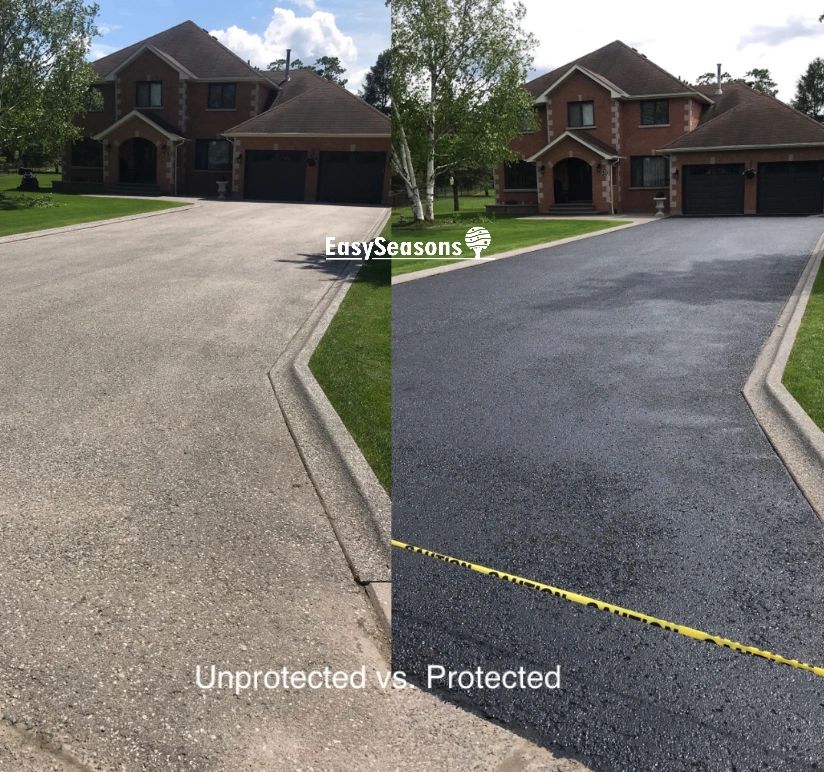Seal in High Quality: Specialist Solutions for Asphalt Repair and Sealing
Seal in High Quality: Specialist Solutions for Asphalt Repair and Sealing
Blog Article
Cold Mix Asphalt Vs. Hot Mix Asphalt: Which Is Right for You?

Composition Distinctions
Cold mix asphalt is generated by emulsifying the asphalt binder with water and an emulsifying representative before mixing it with aggregate. The warm mix asphalt manufacturing process includes heating the accumulation and asphalt binder independently before integrating them at the asphalt plant.
Additionally, chilly mix asphalt often tends to be much less dense and a lot more adaptable than warm mix asphalt. This flexibility makes it far better matched for locations with greater degrees of movement, such as driveways or roads with rush hour. In comparison, hot mix asphalt is known for its high durability and resistance to rutting and splitting, making it a recommended selection for freeways and high-traffic roadways where long life is important.
Installation Process Variations
The procedure of setting up chilly mix and hot mix asphalt displays significant differences in their procedures and requirements. Cold mix asphalt, being an extra adaptable material, can be used directly from the bag or container onto the gap or damaged location. It calls for minimal preparation work, such as cleansing the area and condensing the chilly blend with hand tools. This makes it a hassle-free option for temporary and quick repairs. On the other hand, hot mix asphalt demands a more sophisticated setup procedure. It entails heating up the mixture to high temperature levels before laying it down on an appropriately ready base. The preparation consists of compacting the base, using a tack layer, and utilizing hefty equipment like pavers and compactors for a smooth and durable surface. Due to the heating requirements, warm mix asphalt installations are generally accomplished by professionals with customized devices, guaranteeing a much more irreversible and structurally audio outcome.
Longevity and Long Life Aspects
When considering asphalt alternatives, longevity and longevity are essential factors to evaluate for long-term pavement performance. Warm mix asphalt (HMA) is understood for its extraordinary longevity and long life. The high temperature levels during the laying and blending process enable better compaction, causing a denser and more powerful pavement structure. This results in HMA being more immune to rush hour loads, severe climate condition, and the results old compared to cold mix asphalt (CMA)
In terms of durability, HMA generally outperforms CMA as a result of its remarkable strength and resistance residential properties. HMA pavements have a longer solution life, needing much less constant repairs and upkeep, which can translate to cost savings over time. In addition, HMA pavements are much more conveniently adjustable to fulfill details job requirements, further improving their longevity.
Price Factors To Consider
Considering the economic ramifications is a critical aspect when evaluating the option in between hot mix asphalt (HMA) and chilly mix asphalt (CMA) for sidewalk projects. While the initial price of warm mix asphalt is commonly higher than that of cold mix asphalt, HMA frequently supplies a much more cost-efficient option in the lengthy run due to its exceptional resilience and durability.
Along with material expenses, it's essential to think about the expenditures connected with installation and maintenance when comparing HMA and CMA. HMA typically requires specific equipment and knowledgeable labor for correct Go Here installment, which can affect general job expenses. Alternatively, CMA is much easier to collaborate with and can commonly be applied using less complex methods, potentially reducing setup costs. Eventually, the decision in between HMA and CMA need to consider not just the first price yet additionally the long-lasting monetary implications to identify one of the most cost-efficient choice for the specific sidewalk task.
Environmental Influence Contrast
Contrast of the environmental effects between warm mix asphalt (HMA) and chilly mix asphalt (CMA) reveals distinctive distinctions in sustainability methods. HMA manufacturing needs high temperature levels, leading to boosted energy intake and greenhouse gas discharges.
In addition, the usage of CMA frequently involves reusing existing asphalt pavement, promoting resource conservation and minimizing the amount of waste sent Continued out to landfills. By opting for CMA over HMA, roadway building and construction tasks can contribute favorably to environmental preservation initiatives.
Final Thought
To conclude, the choice between cool mix asphalt (CMA) and warm mix asphalt (HMA) depends on different variables such as make-up, installation procedure, sturdiness, long life, expense, and environmental effect. asphalt repair. While CMA uses a cost-effective and quick service for minor repair work, HMA guarantees exceptional longevity and durability for heavy traffic locations. Consider these aspects meticulously to determine which type of asphalt is the ideal selection for your paving needs

Considering the economic ramifications is a vital aspect when reviewing the option in between hot mix asphalt (HMA) and chilly mix asphalt (CMA) for sidewalk tasks. While the initial cost of hot mix asphalt is generally greater than that of chilly mix asphalt, HMA often offers an extra cost-effective solution in the long run due to its superior sturdiness and durability. angle parking.Contrast of the environmental effects between warm mix asphalt (HMA) and chilly mix asphalt (CMA) exposes distinctive differences in sustainability techniques.In verdict, the go to these guys option in between cool mix asphalt (CMA) and warm mix asphalt (HMA) depends on various elements such as make-up, installment procedure, resilience, longevity, price, and ecological influence
Report this page